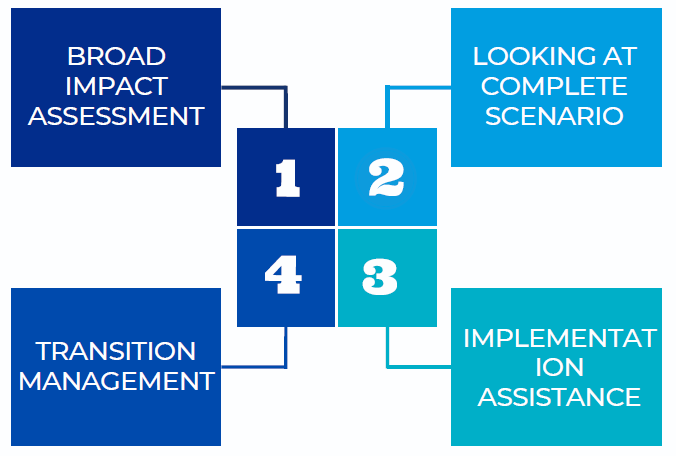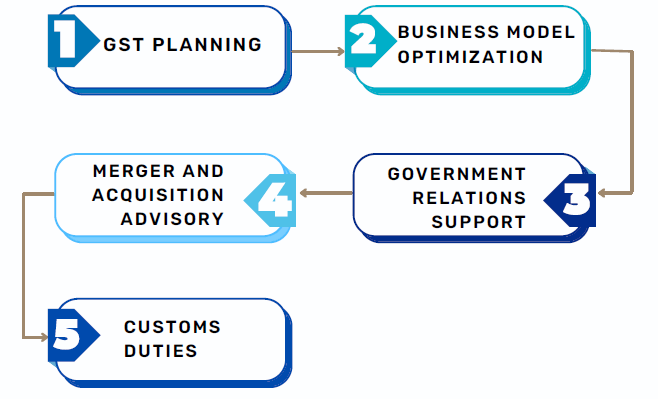GST Advisory Services
Goods and Services Tax is one of the significant indirect tax reforms in India since Independence. It was first introduced in July 2017. Goods and services tax is a single unified tax on both the Goods and Services that is levied only on 'value-added' to goods and services at each stage in the industrial supply chain.
GST has brought a broad impact on each facet of business operations in the country, such as pricing of products and services, optimizing the supply chain, IT accounting, and tax compliance systems. It overall impacts the tax incidence, tax structure, tax payment, tax computation, compliance, credit utilization, and reporting that changed the entire indirect tax system's functioning.
The Government has been very active in structuring its processes and adjusting to the demands of the industry. The various clarifications or changes in law at the time of the introduction of GST were done to ensure that no businesses get affected in the future.
At Tap Global, our professionals assist the clients by providing a varied range of GST Advisory services, including conducting GST diagnostic review, assistance in litigation, advising on various GST related issues and representation before the GST council, etc. Additionally, our GST Advisory experts will help you obtain GST refunds and undertake GST compliances and audits.
What is GST in India?
On 29th March 2017, the Government introduced the Goods and Service Tax to unify the state economies and enhance the country's overall economic growth. GST is a form of indirect tax that subsumes all other taxes. The GST Act became effective on 1st July 2017, and since then, GST has replaced all the taxes that existed before it. GST is a comprehensive tax that is imposed at every stage of the sale.
The GST regime also offers reduced tax liabilities to businesses as per the composition scheme. To get the benefit of this scheme, companies must have a supply turnover of under Rs. 50 lakh, and will also not be able to avail of input-credit. This scheme will not, however, apply to the service industry or businesses making inter-state sales.
What are the Features of GST?
The features of GST are as follows:
Many indirect taxes of both the Centre and the state are integrated under the GST. There are three important indirect taxes at the center. They are union excise duties, service tax, and customs duties. Of these, the service taxes and central excise duties are brought under GST. Customs duties as a tax on trade were not merged with the GST. States, in turn, have combined sales tax with GST.
-
The four-tier rate structure
GST proposed a four-tier rate structure. The Government has fixed the tax-slab at 5%, 12%, 18% and 28% besides the 0% tax on essentials. Essential components such as foods are exempted from taxes under the GST. Other common items are taxed at a rate of 5 %.
There is a differential tax structure under GST. A tax rate of 5% is imposed on essential services. Commercial services are charged at the rate of 18%, whereas standard services at 12%. Services provided by educational institutions are exempted from service tax.
GST applies when the turnover of any business exceeds Rs. 20 lakhs per year. Traders supplying goods to other states need to apply for GST registration even if their sale is less than Rs. 20 lakhs. There is also a composition scheme for a selected group of taxpayers whose turnover is up to Rs. 75 lakhs per year.
-
Tax Revenue Appropriation between the Centre and the States
The Centre and the states share the tax revenue at a ratio of 50:50 except the IGST. The Centre and the states are merging their higher indirect taxes under GST. Both get their own share. For this purpose, the GST council has adopted dual GST components: The Central GST and the State GST.
What are the Benefits of GST Registration?
- GST removes the contradicting effect of the tax.
- Higher threshold for registration.
- Composition scheme for small businesses.
- The number of compliance is less.
- Defined treatment for E-commerce operators.
- Improved efficiency.
- Unorganized sectors are regulated due to GST.
How Tap Global Provides GST Advisory Services?
At Tap Global, we closely monitor the developments on GST. We assist the business in anticipating the policy changes and assessing its impact on their operations. We provide specialized GST Advisory services, including analyzing the impact of GST on business, scenario analysis, including the alternative business model, legislative business level implementation assistance, transition management, and undertaking major compliances. Our GST Advisory services process includes:

Broad Impact Assessment
- Develop a specific level of concept to impact the areas based on the information available in the public domain and compare the GST structures in similar jurisdictions.
- Shift impact areas into the areas of opportunities and threats.
- Help with the representation process to GST policymakers to minimize its impact areas.
- Identify the manner in which opportunities could be improved.
Looking at Complete Scenario
- Perform adequate calculations of the impact of GST on business for the purpose of GST advisory.
- Identify the possible scenarios under which the identified opportunities or issues could be maximized or minimized.
- Short-list all the scenarios that can be implemented for GST preparedness.
Implementation Assistance
- Look at the custom-design changes, internal controls, and accounting as part of GST Advisory.
- Assist in making relevant changes in the supply chain.
- Review and suggest the changes in documentation, processes, and policies to meet the GST requirements.
- Plot manner in which the GST credits and liabilities can be auto-picked for tax pay-outs and compliances.
Transition Management
- Looking at the GST registration process.
- Assisting in meeting the first cycle of GST compliances (invoice formats, returns, etc.).
- Assistance in transitioning the tax credits and liabilities, looking at the rules.
- Address individual needs, such as suggestions in matters related to assistance.
Why Choose Tap Global for GST Advisory Services?

Our GST planning services help in strategically identify the opportunities for reducing the GST liabilities, minimize compliance costs, and improve cash flow.
-
Business Model Optimization
Our GST advisory advisors can help in realigning for business transformation, reorganizing finance, legal, and tax structures.
-
Merger and Acquisition Advisory
Our GST Advisory department properly structures merger and acquisition deals to avoid the hidden tax consequences and helps determine whether the acquisition itself is subject to GST.
-
Government Relations Support
Our GST Advisory experts support clients with engaging or liaising with the Government authorities. They will also help you in preparing for Audit by the Government authorities.
Our professionals in GST Advisory provide customs and GST planning strategies that minimize the tax exposure because certain customs facilities can be extended to include GST.
What is our Role in GST Advisory Services?
Our primary role in GST Advisory services is to evaluate the fiscal impact of GST on business and product pricing. Evaluation of critical parameters includes:
- Changes in the rate of tax
- Changes in both the time and supply rules for goods and services.
- Evaluate the impact on outward supplies.
- Check the GST valuation mechanism, including incidence on free supplies, discounts, incidental supplies, and supplies related parties.
- Analyzing the position on the availability of input tax credits.
To Check, Tax Efficiency Advice on Realigning the Operations
- To identify alternate business models to ensure tax efficiencies and also check on credit-optimization.
- Evaluate all the alternate business models to identify the tax costs involved.
- Identifying all the potential risks and suggest mitigating strategies that are associated with the identified models.
- Define all the business models or contractual scenarios after the discussions with the management that can be implemented.
Advise On the Provisions under the GST Laws
- To ascertain the impact of GST on the prices of products and services because of additional tax costs or credits.
- Advising on the adequate pricing mechanism that must be adopted considering the additional savings or burden and the legal provisions.
- Advising on the appropriate safeguards that need to be adopted.
- Representing before the Regulatory authorities constituted for the purpose of Anti-profiteering.
Ensuring Steps for Smooth GST Transition
- Implementation of the changes in business processes such as establishing procedures for billings, devising a system for receiving advances or payments.
- Guidance on the eligibility of specific credits that is available under the GST regime.
- Evaluating and updating the ability and transferability of existing Input tax credits.
- Assistance provided in preparation and uploading the statutory forms for transition of credits.
- Guidance with regard to the manner of recovering tax from the customers.
- Highlighting major areas for negotiation, with the vendors or customers, maintaining the contractual arrangements.
- Assistance in getting the GST registrations or migrating the existing registrations.
- Preparation and updating of the compliance manuals.
IT Functional Advisory
- Examining the existing IT System based on blueprints and flowcharts that are shared with us, to provide the tax triggers and mapping for all the business transactions.
- Evolve logics based on the changes that are introduced in law including those for the transition of credits.
- Configuring the tax rates and updating the file on the basis of the scheduled rates.
- Advice on all the reports that need to be generated from the system for GST purposes.
- Advice on the structuring of invoices, debit notes, credit notes, and all other related documents.
- Conducting the UAT Testing of the GST version of the IT systems and then prepare and report the observations to the management.
- Final testing of the IT systems to provide a compliance report.
Customized GST Training
- Customized organizational internal training for finance, legal, taxation, commercial, sales, and marketing departments.
- Training for suppliers, vendors, or customers.
How to Reach TAP GLOBAL?

Fill The Form

Get a Callback

Submit Document

Track Progress

Get Deliverables